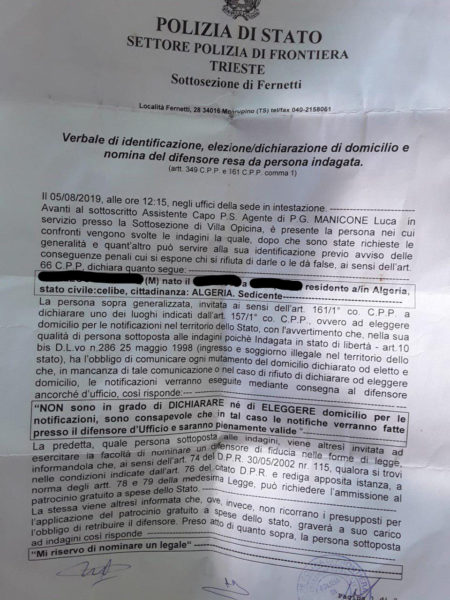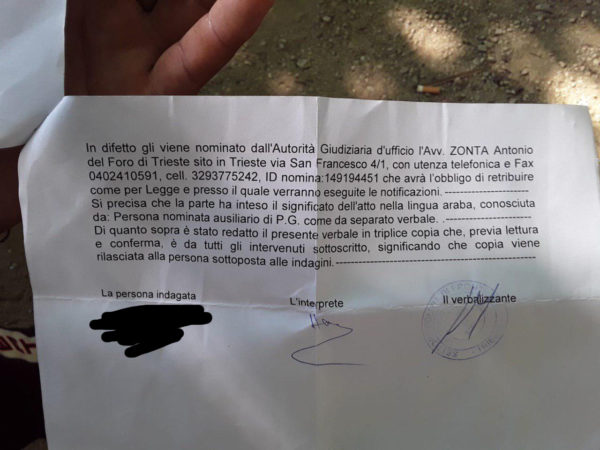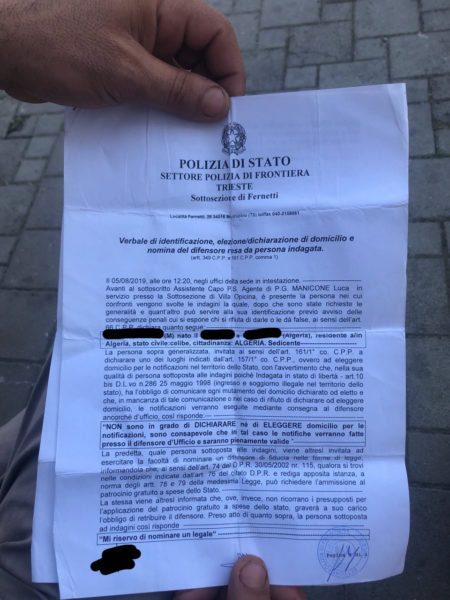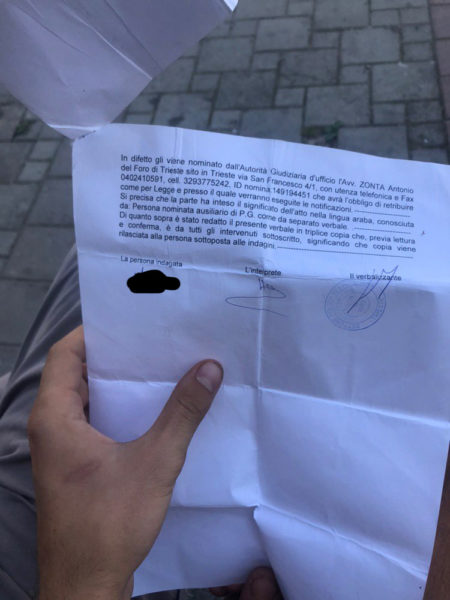The group of ten arrived in a small village near Fernetti, outside of Trieste, Italy (see map below) at 7:00 in the morning on August 5th. They had walked all the way to Italy from Bosnia over the course of many days. The respondent described that after entering into Italy, the group left their bags in the forest.
“We left all of our belongings when we escaped in the forest, already on the way to Italy.”
The respondent described that shortly after this, they were approached by police officers.
We entered [Italy] and everyone there was clapping their hands, celebrating. People gave us food, apples. They were nice and then they called the police. One of my friends saw someone on the phone and right after the police arrived.
The group was close to a bus station during this exchange. After talking to the men some time, the police officers took the group to nearby facility.
“We were close to a regular bus station, outside of the city center. The police arrived and they said on the phone that there is one minor. After that they took us to the camp.”




It is not entirely clear as to what “camp” the respondent and his group were taken to however it is likely that this camp was some sort of center nearby to Fernetti. The respondent described that at the camp, they interacted with a female translator from Morocco.
Then [the] Moroccan woman came: “Do you want to seek asylum or not?” And we said: “No, we don’t have any problem in our country, so there is no reason for us to seek asylum.” If we want to seek asylum for political reason, we need a proof. Then the woman left. The police didn’t do anything, they were not violent.
During their time with the Italian authorities and social workers, the group misunderstood their legal options and the gravity of their situation.
They told us that we are going to the camp. We went to the camp and the police stayed with us during the interview with the Moroccan woman. Then they gave us papers and then they drove us to the border. The police asked us, how we entered and they wanted to see the points at the map.
The group signed several papers during their conversation with the Moroccan translator, however they did not understand what exactly it was that they signed.
We asked the woman, what was on the paper because it was in Italian. She didn’t translate and we didn’t understand what we signed.
The group-members also were made to give their fingerprints during this time and also had their pictures taken. After leaving this “camp”, the group did not understand where they would be taken.
“We didn’t know where we were going and we had doubts. So we looked at the billboards and we understood that we were going to the border.”
“They took us and drove us to [the] Slovenian border.”
When the group understood that they were being brought back, their interactions with the police officers who were transporting them became more tense. There were ten people in the group, however one minor stayed in Italy, meaning that only nine were returned back.
“They started to push a bit. Until then we were good and there was someone translating. I told the translator that they have to find a solution. They can’t just bring us back to Slovenia, knowing that we were in Italy. And they said, we are just migrants, we are not tourists.”
The group was then brought to a border station and handed over to Slovenian custody where they were kept in this station from 4:00 pm on August 5th until 2:00 am on August 6th. After this, the respondent described the group being brought to a “camp” at a different place in Slovenia where they were given food. It was not in Ljubljana. The group had their fingerprints and pictures taken at this station. The respondent described that in Slovenia, there was an Iraqi male translator present. He was described as being around 50 years old. Once again, in Slovenian they were asked to sign papers written in languages that they did not understand:
Again we said to the translator: “We cannot understand, what’s on the paper. Can you please tell us?” He didn’t translate what was on the paper.
In Slovenia, the group was allowed to keep the papers which they had signed in Slovenia and Italy. After being transported to the Slovenian-Croatian border, the group was handed over to Croatian custody.
At the police station in Croatia the group described having a conversation with a police officer who interviewed the group one at a time. The station they were held at was at the border.
“It was like some kind of temporary set up with border police and local police. There were some small rooms we were entering. It was at the border.”
They did not have to sign any papers, give their fingerprints, and did not have their picture taken. During this time, the majority of the group-members had the papers which they had signed in Italy and Slovenian confiscated from them, however two group-members were able hide and hold on to the papers which they had signed in Slovenia. The respondent recalled that at this station, he had a long conversation with a Croatian police officer who expressed regret and sympathy for the situation that the group was in. The officer communicated to the respondent that he did wish to make the journey of these men more difficult however he had orders from his boss to return the men to Bosnia which he could not ignore. This officer went out and bought the group-members food at some point during their stay in the station.
They stayed at this border station for around five hours.
“We left the Croatian border at 7pm [on August 6th]. We arrived at the Bosnian border at 12.”
“We stopped four times on the way but we couldn’t tell where we were and they didn’t open the car. We stayed inside the van.”
There were several other people in the van with the group on this ride to the Bosnian-Croatian border.
“There were two other people with us, one from Pakistan and one from Algeria. They were going from one city to another by bus and they were stopped.”
After arriving to the Bosnian-Croatian border, the respondent described being shown a path into Bosnia by the officers present and told to go back. In total, there were five officers present at the push-back location, two of whom were in the transport van and three of whom were in a separate car. They all wore blue uniforms which were described to be a similar hue to the indigo-blue uniforms worn by local Bosnian police officers in Velika Kladusa.
“One driving, one sitting in the front seat and three in the other car. The car we were in stopped and the two policemen waited for the other car with three policemen.”
Their phones were broken at this time however the group did not experience any direct physical violence. Interestingly, the respondent mentioned that the officer with which he had become friends with in the border station previously was present at the push-back site, having driven back with the group, and was actually the officer who was in charge of breaking their phone. The respondent reiterated that he believed that this officer was a good man who only had to do bad things because of the orders of his superiors. The group was taken one at a time out of the van.
They left us at the border. They stopped and they showed us the way by light, by torch. Then we just walked. They broke our phones before but they didn’t beat us.
The officers at the push-back location broke five mobile phones and six power banks of the group. They did not take any money from the group.
After being pushed back, the group walked approximately 20 kilometers back to Velika Kladusa. The respondent did not remember exactly where he was pushed back however he described it as a location northeast of Velika Kladusa.
